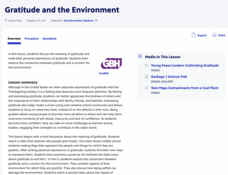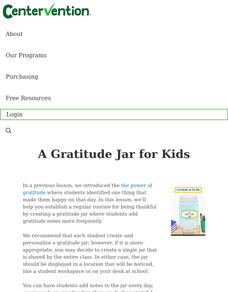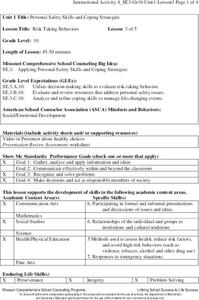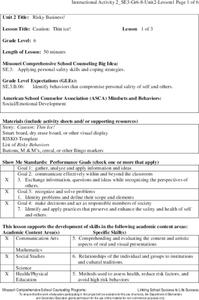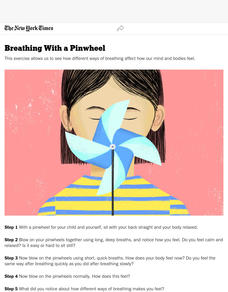Nemours KidsHealth
Smoking: Grades 9-12
The increase in the number of restrictions placed on smoking represents a clear shift in the understanding of the dangers of both the short term and long term consequences of tobacco use. But people still light up. Three activities help...
Nemours KidsHealth
Sportsmanship: Grades 6-8
Losing isn't any fun. It is, however, a part of competing. Two activities encourage middle schoolers to consider what good sportsmanship is, how they can be a good sport, and ways to handle situations when some are acting...
PBS
Gratitude and the Environment
A class discussion begins a two-part lesson about gratitude and the environment. In part one, learners watch a video then share their feelings about its most memorable moment. Delving deep into the meaning of gratitude, scholars create...
Nemours KidsHealth
Empathy: Grades 9-12
Empathy can be the glue that holds a society together. Learning how to see and appreciate a situation from another's point is key to developing empathy toward others. The two activities in this resource are designed to help teens...
Nemours KidsHealth
Conflict Resolution: Grades 9-12
Conflicts happen. Learning to deal with them positively, manage anger, and communicate feelings is the focus of a lesson that gives high schoolers the tools they need for conflict resolution. After reading a series of related articles,...
Centervention
A Gratitude Jar for Kids
A jar becomes a symbol of gratitude in an activity that challenges scholars to reflect on themselves. Learners decorate a jar to add a touch of personalization. Once ready, prompts offer participants a question or sentence frame that...
Centervention
Halloween Worksheet: Monster Feelings
Monsters have feelings, too! Scholars explore a variety of emotions with a festive, Halloween flair with two dice-rolling activities. The first activity prompts learners to draw and write about a monster feeling a specific emotion. The...
Greater Good Science Center
Seeing The Good In Others
Showing gratitude is an intentional act and it's the glue in relationships. That's the big idea in a lesson for tween and teens. Scholars leave post-it thank you notes on other's character strength posters that acknowledge those strengths.
Greater Good Science Center
See The Good Challenge
Scientists study all sorts of things. For example, studies show that it feels good to feel grateful. Feeling grateful also contributes to physical health and strengthen relationships. In the second lesson about gratitude, class members...
Greater Good Science Center
Discover Your Great Full Self
Reflecting on character strengths can bring a little sunshine as the gray days of winter approach. Tweens and teens view a PowerPoint presentation, watch a short video about character strengths, and take a survey that helps them identify...
Centervention
Halloween Worksheets: Emotions Jack-O-Lanterns
Scholars give life to a pumpkin as they design a Jack O'Lantern that exudes a certain emotion. Participants choose one of nine feeling words, or add up to three that aren't listed, locate and cut out face pieces, then glue them to the...
Centervention
Halloween Worksheets: Emotional Monsters
Eight blank monster faces make up an activity that tasks scholars with drawing a face that corresponds to a specific emotion. Feelings include happiness, confusion, silliness, and more.
Centervention
What Makes Me Happy Today?
Here's a worksheet that will put sunshine on papers and smiles on the faces of young learners as they draw pictures and write a short explanation of what makes them happy today. A great way to show gratitude for the good things in life.
University of Oklahoma
Learning About Special Education
The lessons in the second unit in a three-unit series provide students with the historical background of disability education. After reading about events that impacted attitudes towards disabilities and how learners are identified for...
Missouri Department of Elementary
Risk Taking Behaviors
Sophomores can be sometimes wise and sometimes foolish. The same can be said for their behaviors. After watching a presentation about risk taking behaviors, class members discuss the presentation in small groups, and then complete a...
Yale University
inspireED Innovator's Guide
Educators and scholars come together to build a team of go-getters striving for positive change in their school and community. Become an insipreED team with this handy guide designed to get you started. Sixty pages outline the who, what,...
Facing History and Ourselves
Defining Our Obligations to Others
Introduce young learners to the concept of a Universe of Obligation, a term coined by sociologist Helen Fein, with a lesson that asks learners to consider the extent to which they feel a responsibility for others. Class members read and...
Missouri Department of Elementary
Caution: Thin Ice!
Sixth graders listen to a story titled "Thin Ice!" then partake in a whole-class discussion asking and answering questions about what was read. Scholars brainstorm risky behaviors in preparation for a game of RISKO—a game similar to...
Facing History and Ourselves
Why Little Things Are Big
Often our decisions are impacted by a fear of how others see us. That's the big idea in a two-day lesson that asks how false assumptions, how our fear of how others may see us, impact how we act. After watching a video about such a...
Facing History and Ourselves
Understanding Identity
Key to social-emotional learning is understanding who we are. The first lesson in an Understanding Identity unit asks class members to consider the factors that shape one's concept of themselves, the parts of their identity they choose...
The New York Times
Breathing With a Pinwheel
A pinwheel encourages deep breathing to calm one's body and recenter their thoughts. Scholars breathe into a personal pinwheel with different types of breathing patterns then answer a question about how they feel.
Missouri Department of Elementary
How Much Does Smoking Really Cost?
Following a brief survey about tobacco, scholars examine a fact sheet to answer questions about the substance. A practice page challenges the class to determine the cost of the habit using money math. Pupils discuss their findings...
Missouri Department of Elementary
My Feelings
Encourage self-awareness with a lesson that challenges scholars to identify feelings—happy, sad, mad, and scared. Using a feelings thermometer, similar to that of a bar graph, pupils discuss how they would feel in specific scenarios then...
Missouri Department of Elementary
What are Comfortable (Good) and Uncomfortable (Bad) Feelings?
Two puppets open a discussion about comfrotable and uncomfortable touches. Scholars add to the discussion information they remember from a previous lesson, then delve deep into three problem-solving safety rules, and explore...




